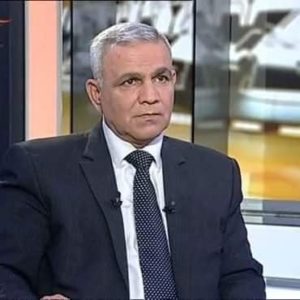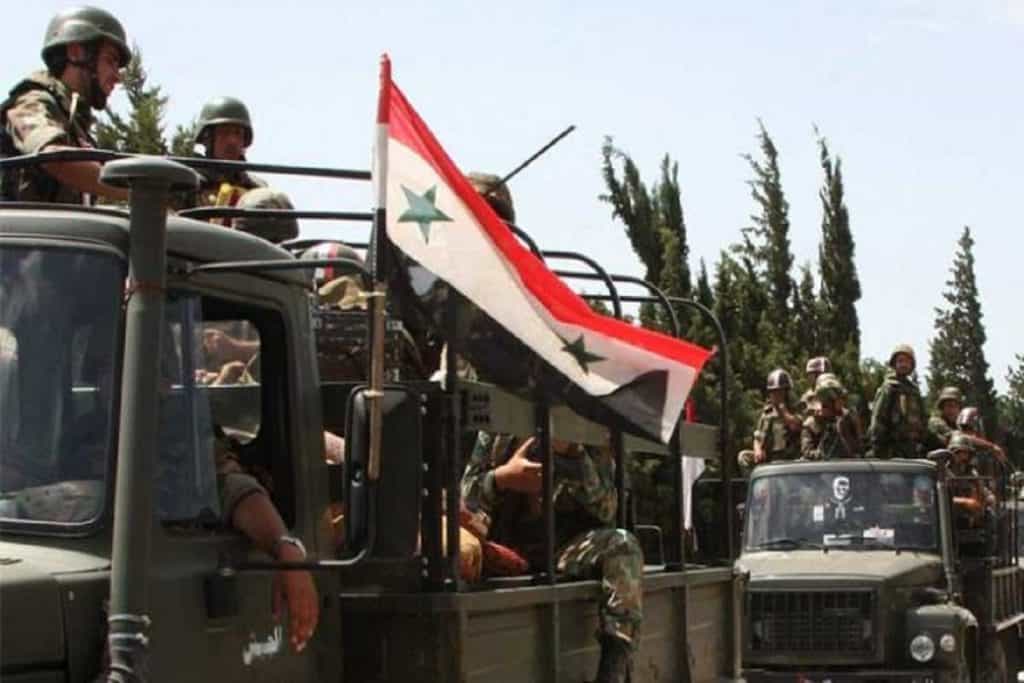As a result of the large-scale offensive of the Syrian Arab Army in Idlib province and the liberation of the city of Khan Sheikhun, another round of Russian-Turkish negotiations began. Turkish President Recep Erdogan went to meet with his Russian counterpart Vladimir Putin in order not to agree, but to ask for the security of the Turkish army units blocked at an observation post in the vicinity of the city of Murek. In turn, the advance of the SAA forces gave Moscow an occasion to dictate its own terms of the deal with the Turks. In order not to provoke Russia to organize a new stage of an attack on the position of the Turkish troops, Ankara was forced to agree to purchase Su-35 and Su-57 military aircraft from Moscow. This was at the cost of containing the forces of the SAA in Idlib.
Specifically for World Geostrategic Insights, we talked about this with the Lebanese military expert, and national defense consultant, Omar Khalil Maarabouni.

1. The victory of the Syrian Arab Army related to the liberation of the city of Khan Sheikhun in Idlib province led to the fact that almost two days later, Turkish President Recep Erdogan flew to meet with Russian President Vladimir Putin to negotiate the fate of the Turkish military at the observation post in the vicinity of the city of Murek. And it was on the day of the Russian-Turkish meeting on August 27, 2019 that the militants of the pro-Turkish armed forces operating in Idlib went on the offensive and took control of 3 settlements, while the SAA offensive was suspended, despite the fact that another 25 August 2019 the Syrian official press was full of reports of a victorious march for the liberation of the entire province of Idlib. Does this mean that through the agreements reached between Recep Erdogan and Vladimir Putin, the military successes of the Syrian government have been called into question? Does Damascus recognize the agreement concluded between Moscow and Ankara regarding the unblocking of Turkish observation posts in the Syrian province of Idlib?
– Undoubtedly, the facts indicate that the Syrian Arab Army won a major victory not only in the city of Khan Sheikhun, but also included most of the northern countryside of Hama and part of the southern countryside of Idlib. In addition, the SAA has a new line of action on the borders of Jabal al-Zawiya, a fortified area where militant groups take refuge. The Turkish observation post in the vicinity of the city of Murek is completely surrounded and receives logistical support from the Russian armed forces, which are located at a distance of 1 km from the Turkish facility.
In principle, we can talk about the end of the Turkish Point mission due to the lack of terrorist groups, since this point was entrusted with monitoring tasks in the demilitarized zone, which Turkey did not fulfill, forcing the SAA to conduct a major military operation. According to information, the Syrian army is ready to complete its mission related to the consecutive opening of the M5 and M4 roads. At the moment, the terrorist groups do not control the three cities, as the SAA units are preparing to advance to the city of Al-Taman east of the city of Khan Sheikhun and, possibly, to launch operations from the southeastern part of Idlib in the direction of Marat-en-Numan and Sarageb.
As for the agreement between Presidents Putin and Erdogan, it is known that the Russians are holding constant consultations with the Syrian state and do not agree with anyone in Syria until they consult with Damascus. In turn, the regime of Bashar al-Assad is almost completely dependent on Moscow’s policy in the region, and therefore the SAA units will perfectly comply with the recommendations of the Russian military command.
2. Many Syrian officers taking part in the military operation to liberate Khan Sheikhun were disappointed by the fact that as a result of pressure from Turkey and Russia, they were forced to ignore the militants’ offensive, thereby effectively giving way to previously liberated settlements. Is it so? Is it possible in the ranks of the SAA, operating in Idlib, the practice of non-compliance with the orders of the Russian military command regarding the suspension of the attack on the positions of jihadists?
– CAA officers are a disciplined group that obeys the orders of the central command of the army and armed forces of Syria and does not receive direct instructions from Russian troops. The coordination between the Syrian Arab Army and the Russian army is at the highest level and does not depend on the emotions of the soldiers, but on the nature and content of the agreements. This cooperation and coordination between the Russian and Syrian armies, as well as the level of coordination, which is within the framework of regular and harmonious relations, are not overshadowed by any problems that may affect the fulfillment of missions.
Russian President Vladimir Putin said at a recent meeting with Recep Erdogan that liquidation of terrorist groups was necessary, which gave the Turkish leader the last chance to fulfill his obligations, which the Russian and Syrian sides expect. The same armed groups that will resist Moscow, regardless of whether they are part of the SAA or not, can be declared “illegal”, as a result of which they will be treated like terrorists, as a result of which they can be destroyed.
3. Almost immediately after the Syrian Arab Army blocked the Turkish observation post near the city of Murek, the Russian military police began patrolling in this area in order to neutralize any manifestation of tension between the Turkish and Syrian armed forces. Nevertheless, it is logical to admit a situation where, under the influence of various factors, accidental clashes may occur between Turkish military personnel blocked on the territory of the observation post and SAA units. In this case, such a risk is minimal, but it still exists. In this case, what will Russia do to neutralize tensions? Indeed, if the Russian military police during the likely clashes in the vicinity of the city of Murek will take the side of the Turkish military, then this step will be regarded in Damascus as an act of betrayal. In turn, if the Russian military police take part in the conflict on the side of the Syrian government forces, this will hammer the last nail into the coffin of Russian-Turkish relations. At the same time, Russians will also not be able to stay away in the event of shootings near the Turkish observation post, since one way or another they expect any reaction from them, other than non-intervention. What is the most viable scenario? Is it worth admitting that clashes in Idlib are generally impossible between Turks and Syrians?
– Before the liberation of the city of Khan Sheikhun, Syrian planes bombed Turkish convoys and did not allow them to advance to the city. However, they were not able to reach the level of direct clash due to the agreements of the Russian troops with the Turkish army on the need to block the convoy and the implementation of the Astana and Sochi agreements. As for the possible clashes between the SAA units and the Turks, this is unlikely to be resolved directly, since it should be noted that there is no direct contact between the SAA soldiers and the Turkish point. If, as a result of any circumstances, a collision occurs, it will be eliminated in such a way as to attract as little attention as possible and minimize damage to both sides of a potential conflict.
4. In order to create objective obstacles to the offensive of the Syrian Arab Army in Idlib, Ankara can organize the delivery of military assistance to the “National Liberation Front” and the armed group “Jaish al-Izza”. This assistance is likely to include anti-tank missile systems. Among other things, Turkey is likely to attempt to redeploy a significant strike group of the Syrian National Army from Operation Shield of the Euphrates. At the same time, Ankara will seek to ensure control over the territory between the M4 – M5 highways in Idlib, thereby creating a “buffer zone” between the Syrian government forces and its army units. Is the presented list of Turkish “containment measures” exhaustive or is Turkey planning to use additional pressure tools on the SAA to prevent their further attack?
– Turkey has never stopped providing military and logistical assistance to groups close to Jabhat al-Nusra, which is due to Turkey’s failure to fulfill its obligations both to separate the groups and to maintain the demilitarized zone. As for the mobilization by Turkey of the forces of the National Liberation Front and Jaish al-Izza, it is already being produced. Ankara will try to conduct maneuvers in order to evade the implementation of agreements with the Russians and Iranians, as was done earlier, but this did not prevent the SAA from conducting its recent military operation. And I think that if Turkey takes any maneuvers to avoid observing the terms of the agreements with Moscow, then it will give an opportunity to the SAA forces to complete their combat tasks to block the M5 and M4 roads, knowing that Turkey will continue to try to use any pressure cards in order to prevent this step.
Image Credit: alquds.co.uk







